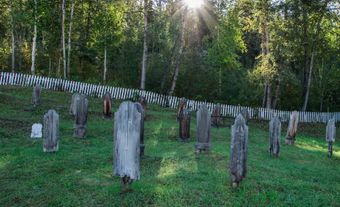Bible Schools
His lay college sought to "do for lay Christian men and Women just what the seminaries do for the clergy." One of the first Bible schools was established in Nyack, NY (1882) by the Canadian founder of the Christian and Missionary Alliance Church, A.B. Simpson and by evangelist D.L. Moody (Moody Bible Institute, Chicago, 1887). In 1894, the Toronto Bible Training School (now Tyndale University College and Seminary), which was modelled on Moody's institute, became the first permanent Canadian Bible school and the third Bible school in North America.
Bible institutes and colleges provide a place for students to grow academically, socially and spiritually. In general they provide a deeper understanding of the Bible, instil a Christ-centred worldview, and encourage evangelical traditions. No single term describes the variety of Bible schools. All offer Bible-centred programs, evangelical theology Christian service components, and promote overseas and home missions that encourage personal devotional piety. The term "Bible institute" refers to unaccredited colleges similar to small Bible colleges but offer few if any liberal arts courses. Some colleges, such as Prairie Bible Institute, have retained the term in their name but are in fact Bible colleges.
Seminaries are, in a sense, the graduate level of Bible colleges, offering a variety of degrees in areas such as counselling and leadership. While students attend Bible college for a variety of reasons, such as a spiritual experience and to prepare for missions or church ministry, seminary students are more likely to prepare for professional ministry. Some Evangelicals have suggested that these institutions represent a resurgence of Protestant spirituality and a way to understand secular humanism and agnosticism. Schools and seminaries also provide students with access to higher education in a Christian environment.
Social and Economic Factors
Social scientists draw attention to economic and social factors, noting that the great period of growth for Bible schools and colleges (particularly in western Canada) followed the Great Depression and the Second World War and continued until 1960. For instance, William Aberhart, fundamentalist radio preacher and charismatic founder of the Social Credit Party, started the Calgary Prophetic Bible Institute in Calgary (1927-1974). Another school that was established during the Depression is the Alberta Bible College, which was founded in 1932 by the elders of the Lethbridge Church of Christ. The College was moved to Calgary in 1937 and continues to provide students a ministry-focussed education.
As with secular institutions, Bible schools have evolved and today there are several distinct types of schools. The discipleship schools, such as Youth with a Mission (YWAM), emphasize personal spiritual development and effectiveness in practical ministry. Many youth missions incorporate a student internship assisting the poor, spreading the gospel, and students are often billeted with local families to gain a sense of the local culture and conditions. The academic component of the program may be taught by resident or visiting instructors. Such schools offer certificate rather than degree programs.
Christian university colleges evolved from large Bible colleges that sought to offer a wider variety of degrees while maintaining their Bible courses and Christian character. Generally, university colleges are independent institutions that offer undergraduate degrees in areas such as business, the humanities, education and some sciences. Efforts have been made by such colleges to gain recognition and allow transfer of courses to the larger provincial universities, while retaining the freedom to develop their individual programs. Trinity Western University, the largest of these institutions, is one of only four members of Christian Higher Education Canada (CHEC) to be accepted into the Association of Universities and Colleges of Canada.
Between these two categories is the Bible college, a school with, generally, fewer than 300 students and offer a program combining academics and Christian discipleship. These colleges are large enough to offer a variety of program specialties such as youth ministry and theology in addition to liberal arts courses. They are often accredited by the province to grant degrees, though graduates are more likely to be transfer to seminaries rather than secular universities.
Discipleship schools seeking to university accreditation have shifted their faith-based identity, for example, the University of Winnipeg was originally a Methodist training school. The change in an institution's academic focus was sometimes greeted with suspicion by the school's conservative boards and alumni, especially in Western Canada.
Fostering Higher Standards of Learning
Since 1959 about 40 Canadian Bible schools and colleges have organized as the Association of Canadian Bible Colleges (ACBC incorporated 1968) to foster higher standards of learning. Until the 1960s most Bible colleges accepted students without a high school diploma, partially because less than 50% of the population had such a diploma, with the number being below 20% in the 1920s. Most Bible colleges offer four categories of specialization: General Bible (theological), Christian Education, Missions and Church Music. Some schools also offer a pastoral program leading to the ministry and this Bible-centred curriculum is augmented by structured programs requiring students to participate regularly in Christian service. Also, virtually all of these institutions originally emphasized biblical prophecy from a pre-millennial point of view (see Millenarianism).
Since 1894 more than 340 Bible institutions have been established in Canada, including part-time day or evening schools with fewer than 10 students and full-time institutions with enrolments up to 3 000. It was only after 1920, that the movement burgeoned across Canada with more than two thirds of the institutions located in western Canada. In 1960, 47 Bible schools and colleges had 3417 students, and 25 years later the ACBC reported 37 schools belonging to the association, with a total enrolment over 5426.
Most Bible schools and colleges have direct denominational affiliation, but approximately 15% are interdenominational (operated by an independent board of directors). Mennonites have the largest number, followed by pentecostals, Holiness Churches, baptists, the Church of Christ, the Church of God, the Missionary Church, and the Christian and Missionary Alliance.
Missionary Endeavours
The Prairie Bible Institute was one of the largest Bible schools in North America when its enrolment reached 900 in 1949. Since that time, some of the interdenominational institutions such as the Prairie Bible Institute (Three Hills, AB), the Briercrest Bible Institute (Caronport, SK) and Providence College (Otterburne, MB) have achieved national and international attention, especially through missionary endeavours.
See also Catholicism

 Share on Facebook
Share on Facebook Share on X
Share on X Share by Email
Share by Email Share on Google Classroom
Share on Google Classroom


